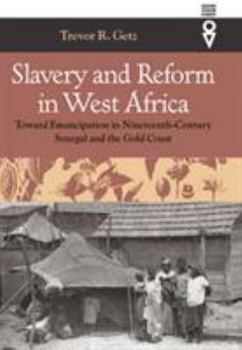Slavery and Reform in West Africa: Toward Emancipation in Nineteenth-Century Senegal and the Gold Coast
Select Format
Select Condition 
Book Overview
A series of transformations, reforms, and attempted abolitions of slavery form a core narrative of nineteenth-century coastal West Africa. As the region's role in Atlantic commercial networks underwent a gradual transition from principally that of slave exporter to producer of "legitimate goods" and dependent markets, institutions of slavery became battlegrounds in which European abolitionism, pragmatic colonialism, and indigenous agency clashed.
Format:Hardcover
Language:English
ISBN:0821415204
ISBN13:9780821415207
Release Date:April 2004
Publisher:Ohio University Press
Length:257 Pages
Weight:1.27 lbs.
Dimensions:0.9" x 6.3" x 9.5"
Customer Reviews
0 rating





